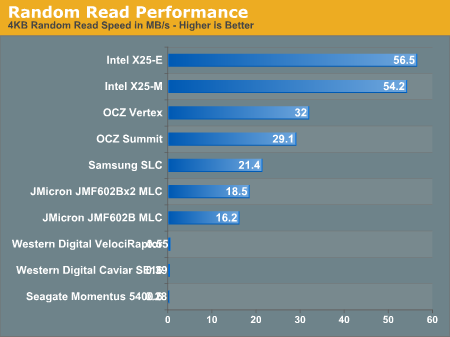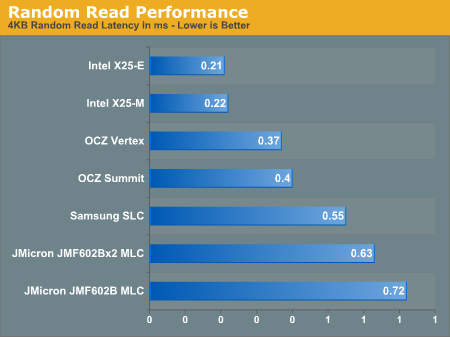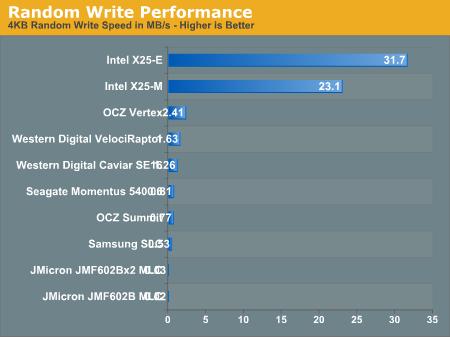The SSD Anthology: Understanding SSDs and New Drives from OCZ
by Anand Lal Shimpi on March 18, 2009 12:00 AM EST- Posted in
- Storage
Random Read/Write Performance
Arguably much more important to any PC user than sequential read/write performance is random access performance. It's not often that you're writing large files sequentially to your disk, but you do encounter tons of small file reads/writes as you use your PC.
To measure random read/write performance I created an iometer script that peppered the drive with random requests, with an IO queue depth of 3 (to add some multitasking spice to the test). The write test was performed over an 8GB range on the drive, while the read test was performed across the whole drive. I ran the test for 3 minutes.

The three hard drives all posted scores below 1MB/s and thus aren't visible on our graph above. This is where SSDs shine and no hard drive, regardless of how many you RAID together, can come close.
The two Intel drives top the charts and maintain a huge lead. The OCZ Vertex actually beats out the more expensive (and unreleased) Summit drive with a respectable 32MB/s transfer rate here. Note that the Vertex is also faster than last year's Samsung SLC drive that everyone was selling for $1000. Even the JMicron drives do just fine here.
If we look at latency instead of transfer rate it helps put things in perspective:

Read latencies for hard drives have always been measured in several ms, but every single SSD here manages to complete random reads in less than 1ms under load.
Random write speed is where we can thin the SSD flock:

Only the Intel drives and to an extent, the OCZ Vertex, post numbers visible on this scale. Let's go to a table to see everything in greater detail:
| 4KB Random Write Speed | |
| Intel X25-E | 31.7 MB/s |
| Intel X25-M | 23.1 MB/s |
| JMicron JMF602B MLC | 0.02 MB/s |
| JMicron JMF602Bx2 MLC | 0.03 MB/s |
| OCZ Summit | 0.77 MB/s |
| OCZ Vertex | 2.41 MB/s |
| Samsung SLC | 0.53 MB/s |
| Seagate Momentus 5400.6 | 0.81 MB/s |
| Western Digital Caviar SE16 | 1.26 MB/s |
| Western Digital VelociRaptor | 1.63 MB/s |
Every single drive other than the Intel X25-E, X25-M and OCZ's Vertex is slower than the 2.5" Seagate Momentus 5400.6 hard drive in this test. The Vertex, thanks to OCZ's tweaks, is now 48% faster than the VelociRaptor.
The Intel drives are of course architected for the type of performance needed on a desktop/notebook and thus they deliver very high random write performance.
Random write performance is merely one corner of the performance world. A drive needs good sequential read, sequential write, random read and random write performance. The fatal mistake is that most vendors ignore random write performance and simply try to post the best sequential read/write speeds; doing so simply produces a drive that's undesirable.
While the Vertex is slower than Intel's X25-M, it's also about half the price per GB. And note that the Vertex is still 48% faster than the VelociRaptor here, and multiple times faster in the other tests.










250 Comments
View All Comments
matrixireland - Thursday, December 24, 2009 - link
hi would like to know what you pros think of the;Golden Leopard ASAX-ZIF1.8-SSD? what would you add to it?
And how would you rate it against other ssd?
Specifications:
product description
ASAX-ZIF1.8-SSD is a high-performance design solid state drive based on the high-end micro-control IC with flash memory storage medium integrated advantaged of high speed,convenient ,aseismatic,energy-saving etc.
specification
Model
Size
Interface
Material
ASAX-ZIF1.8-SSD
1.8inch 70×54×6mm
ZIF
Aluminum-magnesium alloy appearance ,drawbench and colorful oxidation surface,elegant temperament
performance
read speed:80- 96Mbytes/second write speed:50- 60Mbytes/second
support ATA-7 V3 PIO/multi word/ultra DMA MODES
Low power TFBGA,4 channel of flash controller,masked ROM and data SRAM
SAMSUNG flash keeps the data faster on reliability and endurance
Dynamic and static wear-leveling prolong NAND FLASH and SSD for longer life
8/16 bit BCH ECC data error correction ability effectively guarantee the data read security.
Design consideration
Capacity
16G/32G/64G/128G/256G
Average access time
<0.25MS
operating temperature
0-85°
power consumption
DC Input Voltage(3.3V or 5 V ± 10%)Read and write:135mA/194Ma wait:70mA
shock
1500G
Application
the Laptop, pc, server,workstation,portable media player,digital collection apparatus and any computer equipment which need consecutive read and write speed and high reliability storage.
jay401 - Wednesday, March 18, 2009 - link
yeah, he wants "more expensive than" or "too expensive for".Spoelie - Wednesday, March 18, 2009 - link
Second page as well:missing charts before and after this paragraph:
"The chart above shows how much faster these affordable MLC SSDs were than the fastest 3.5” hard drive in sequential transfers. But now look at random write performance:"
Spoelie - Wednesday, March 18, 2009 - link
chart 1 on page 2 now shows sequential read but the paragraph is changed to mention random read ;)page 21: As far as I know, this is THE one of THE only reviews
Some very surprising benchmark results for the ocz vertex, I thought the new firmware tanked sequential read speeds (to 80-90) based on the explanation beforehand, but not according to the actual graphs.
Spoelie - Wednesday, March 18, 2009 - link
third page, first table, first column: SSD and HDD entries are switchedmikaela - Tuesday, March 16, 2010 - link
yeah great info. also great resourceSpoelie - Wednesday, March 18, 2009 - link
page 19: I’d never reviewed it'd & -ed?
HolyFire - Wednesday, March 18, 2009 - link
"I'd never reviewed it" is correct. "I'd" here means "I had", it's Past Perfect tense.FishTankX - Wednesday, March 18, 2009 - link
That should have bolded "too"FishTankX - Wednesday, March 18, 2009 - link
Also, I think the velociraptor vs X-25 figures are swapped. 6 odd ms for the intel drive and 0.11ms for the velociraptor..